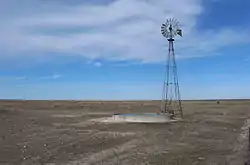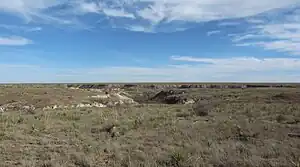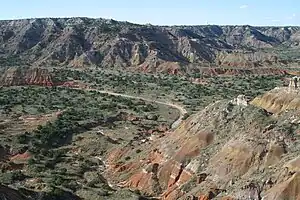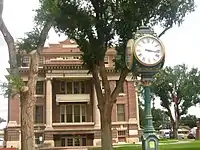Texas Panhandle | |
|---|---|
Region | |
 Windmill on the level plains of the Texas Panhandle | |
 Map of the Texas Panhandle | |
| Coordinates: 35°29′N 101°24′W / 35.483°N 101.400°W | |
| Country | |
| State | |
| Region | High Plains |
| Area | |
| • Total | 67,046 km2 (25,887 sq mi) |
| Population (2020) | |
| • Total | 434,358 |
| • Density | 6.5/km2 (17/sq mi) |
| Time zone | UTC−6 (Central) |
| Area codes | 806, 940 (Childress County) |
| Website | Handbook of Texas: "Panhandle" |
The Texas Panhandle is a region of the U.S. state of Texas consisting of the northernmost 26 counties in the state. The panhandle is a square-shaped area bordered by New Mexico to the west and Oklahoma to the north and east. It is adjacent to the Oklahoma Panhandle, land which Texas previously claimed. The 1820 Missouri Compromise declared no slavery would be allowed in states admitted from the Louisiana Purchase above 36°30′ north latitude. Texas was annexed in 1845 from still more westerly land. The Compromise of 1850 removed territory north of this line from Texas, and set the border between the Texas Pandhandle and the New Mexico Territory at the 103rd meridian west. The eastern border at the 100th meridian west was inherited from the Adams–Onís Treaty of 1819, which defined the border between the United States and New Spain. The Handbook of Texas defines the southern border of Swisher County as the southern boundary of the Texas Panhandle region.
Its land area is 25,823.89 sq mi (66,883.58 km2), or nearly 10% of the state's total. The Texas Panhandle is slightly larger in size than the US state of West Virginia. An additional 62.75 sq mi (162.53 km2) is covered by water. Its population as of the 2010 census was 427,927 residents, or 1.7% of the state's total population. As of the 2010 census, the population density for the region was 16.6 per square mile (6.4/km2). However, more than 72% of the Panhandle's residents live in the Amarillo Metropolitan Area, which is the largest and fastest-growing urban area in the region. The Panhandle is distinct from North Texas, which is further south and east.
West of the Caprock Escarpment and North and South of the Canadian River breaks, the surface of the Llano Estacado is rather flat. South of the city of Amarillo, the level terrain gives way to Palo Duro Canyon, the second-largest canyon in the United States. This colorful canyon was carved by the Prairie Dog Town Fork Red River, a tributary of the Red River. North of Amarillo lies Lake Meredith, a reservoir created by Sanford Dam constructed on the main stem of the Canadian River. Lake Meredith and the Ogallala Aquifer are the primary sources of freshwater in this semi-arid region of the High Plains.
Interstate Highway 40 passes through the Panhandle, and also passes through Amarillo. The freeway passes through Deaf Smith, Oldham, Potter, Carson, Gray, Donley, and Wheeler Counties.[1]


Demographics
As of the census of 2020, about 434,358 people lived in the Panhandle. Of these, 53.6% were non-Hispanic White, 35.2% were Hispanic, 4.8% were African American, 2.8% were Asian. Only 4.1% were of some other ethnicity.[2] About 92.3% of inhabitants claimed native birth, and 8.9% were veterans of the United States armed forces; 49.9% of the population was male, and 50.1% was female. Around 13.2% of the population was 65 years of age or older, whereas 27.8% of the population was under 18 years of age.
Counties
Twenty-six counties of the Panhandle (west to east, from the northwest corner):[3][4]
Cities and towns
Major cities of the Texas Panhandle with populations greater than 10,000 include:
Some of the smaller towns with populations less than 10,000 include:
- Booker
- Bovina
- Cactus
- Canadian
- Channing
- Childress
- Clarendon
- Claude
- Dalhart
- Darrouzett
- Dimmitt
- Dodson
- Follett
- Friona
- Fritch
- Groom
- Gruver
- Happy
- Hartley
- Higgins
- Lefors
- Masterson
- McLean
- Memphis
- Mobeetie
- Panhandle
- Perryton
- Sanford
- Shamrock
- Silverton
- Spearman
- Stinnett
- Stratford
- Sunray
- Texline
- Tulia
- Turkey
- Vega
- Wellington
- Wheeler
- White Deer
Gallery
 Amarillo is the largest city in the Texas Panhandle.
Amarillo is the largest city in the Texas Panhandle.
 The Dallam County Courthouse in Dalhart, Texas.
The Dallam County Courthouse in Dalhart, Texas.
See also
- Antelope Creek phase
- Buffalo Lake National Wildlife Refuge
- Caprock Escarpment
- List of geographical regions in Texas
- List of airports in the Texas Panhandle
- Llano Estacado
- Oklahoma Panhandle
- Palo Duro Canyon
- Prairie Dog Town Fork Red River
- Texas State Highway 207
- West Texas
- National Register of Historic Places listings in the High Plains region of Texas
References
- ↑ The Tascosa Pioneer, October 11, 1890, quoted in Lester Fields Sheffy, The Life and Times of Timothy Dwight Hobart, 1855–1935: Colonization of West Texas (Canyon, Texas: Panhandle-Plains Historical Society, 1950), p. 156
- ↑ "The Regions of Texas". Texas Counties.net. Retrieved July 26, 2022.
- ↑ Counties of the Texas Panhandle United States Census Bureau
- ↑ "PANHANDLE". Texas State Historical Association. Retrieved October 13, 2014.
